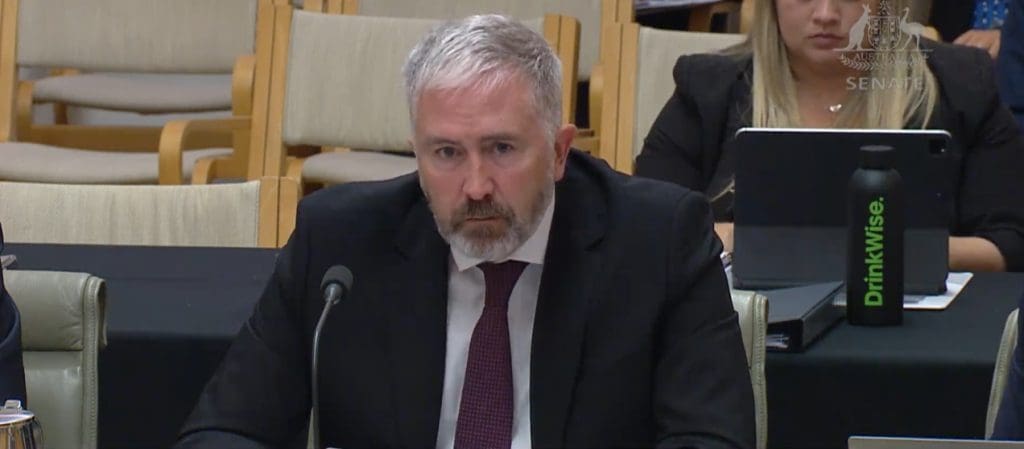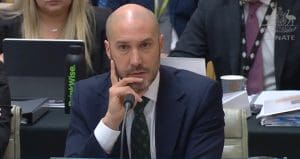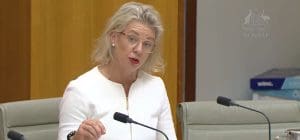
Assistant Minister for Agriculture Fisheries and Forestry Anthony Chisholm in Senate Estimates: ad campaign was not an inner-city vote grab.
THE Australian Government has denied a $2.3 million public advertising campaign for the live sheep transition process was aimed at gaining Green and Labor voter support in inner-city seats in the coming federal election.
This was despite admissions to a Senate Estimates hearing yesterday that no money was spent on advertising a recent round of transition consultation workshops in Western Australia, but live sheep phaseout ads were running in metropolitan areas nationally.
The Senate’s Rural and Regional Affairs and Transport Legislation Committee yesterday was told that the campaign run by the American company Universal McCann had targeted print, and social media advertisements in country and metropolitan areas nationally.
The disclosures prompted Nationals leader David Littleproud to claim the advertising campaign was a sham and waste of taxpayers’ money “aimed at inner-city seats, instead of helping our WA live sheep farmers to get the information they need.”
“It is obvious Labor is using the ads in Melbourne and Sydney seats to appease the animal activists and prove that it is fulfilling its election commitment to phase out live sheep exports.
“In the final days before the election is called, Labor knows it needs Greens preferences and is clearly now using this money as the start of its election campaign,” he said.

DAFF assistant secretary Matt Lowe.
Department of Agriculture Fisheries and Forestry assistant secretary Matt Lowe told the RRAT committee that Universal McCann is the Australian Government’s mandatory and sole advertising agency for media buying placements. He said the company placed ads in radio, print media and some online through social media.
He said the ads were running nationally, except for the Northern Territory and most of north Queensland.
“The advertising is simple in fact and nature – it talks to the decision to phase out live sheep exports by seas by 2028, the transition assistance that’s available and where to find information in relation to finding assistance,” he said.
When asked why ads were run in Melbourne about the transition assistance, Mr Lowe said it “is a recognition that the sheep industry is a national industry.”
“The sheep industry has an interest more broadly in what’s happening in the industry, so we think its important that the advertising is available to everyone who has an interest in the sheep industry.”
When asked how many Victorians or people in which Melbourne suburbs would be seeking live sheep phaseout transition assistance or have an interest in the industry, former Victorian Mr Lowe said there is a range of supply chain participants in Melbourne in the sheep industry.
Senator Canavan said the government is using funds that they otherwise have told farmers are there to help them to transition, “to try and promote their own policy across the country ahead of an election, that’s what’s happening here.”
Assistant Minister for Agriculture Fisheries and Forestry Anthony Chisholm disagreed and said it is not unusual for governments to advertise about decisions that have been made.
“Which is obviously what we are doing.”
Senator Bridget McKenzie said the government is taking money out of the pockets of the live sheep industry to tell Greens voters in inner-city eastern state seats to vote Labor.
Mr Chisholm said the government is communicating decisions the government has made which are important.
“That’s is not an unusual proportion for government to do.”

Victorian Nationals Senator Bridget McKenzie in Senate Estimates yesterday.
Senator McKenzie again suggested to Mr Chisholm that the advertising campaign was more about advertising to Greens voters in inner-city urban electorates on the east coast “that you had shut down the live sheep trade and had provided some paltry assistance for the industry in Western Australia as a fulfilment of your election commitment and your far left wing credentials rather than actually supporting the agricultural industry in WA?”
“There is just no basis for that claim Senator McKenzie,” Mr Chisholm said.
“As I said it is not unusual once decisions are made for governments to advertise so that people can be informed of those decisions.”
He said there are plenty of people in markets other than Western Australia that will be interested in those developments, including a meat processor that might see an opportunity.
“I think it is important for government, and I’m sure that your government did this when they were in power as well, to advertise government decisions so that the public can be informed of those and have the opportunity to engage with the department on the opportunity that is available as we transition away from live sheep exports.”
The committee was told no advice was given to Universal McCann on where to place the ads, but the starting point was that the information be simple and factual and point to the transition assistance that is available and to further information could be accessed, Mr Lowe said.
“We then relied on their advice (Universal McCann’s) in terms of the more detailed approach to the placement of advertising.”
The committee was told that three quarters of the ad spend went to radio especially in Western Australia, plus five metro and 15 rural newspapers, plus social media, but was later told that the government did not advertise the transition co-design workshops held in Western Australia recently.

What a shameful waist of money that could have gone to WA sheep farmers. I was in Newcastle in New South Wales and the ad was getting air time there. It sounds like most local government. Local government managers pushing through extra spending/funding of their council areas to qualify for a larger pay, while farmers need to work more unpaid overtime to pay their Increasing rates.